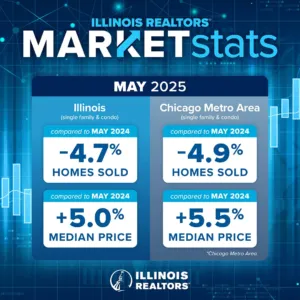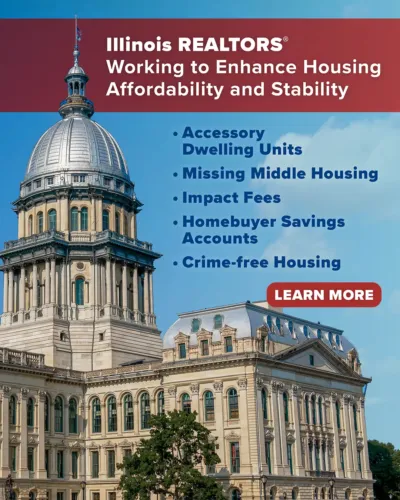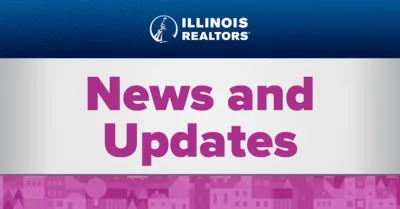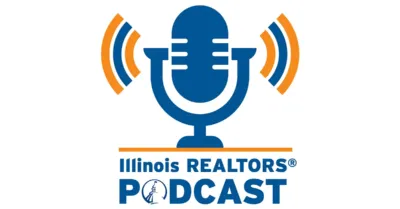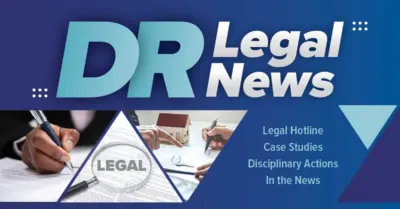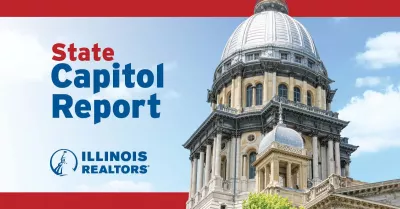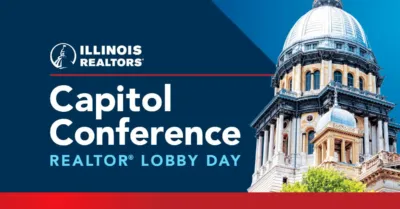Legal Case Studies: July 2023
Legal case studies in this issue:
- Permissive Possession Cannot be Adverse Possession
- Successor Owners Bound to Municipal Annexation Agreement
- A Broken Promise Not Enough to Impose Liability Under Illinois Local Government Employees Tort Immunity Act
- 1st District Confirms Judicial Foreclosure Sale Absent Evidence of “Prejudicial Unfairness”

Permissive Possession Cannot be Adverse Possession
Stoehr v. Saville, 2023 IL App (4th) 220751
In 2001, James A. Smith (“Smith”) purchased a 34-acre parcel of land from Barbera Peters (“Peters”) located in Tazewell County, Illinois. When Smith purchased the parcel, several individuals, including Jeffrey Saville (“Saville”) occupied it, living in several cabins. Saville rented a lot on the land from Peters since the 1980s, owning a house on the rented lot. When Smith purchased the entire parcel from Peters, Saville became Smith’s tenant.
In 2003, Smith recorded a subdivision plat, dividing the 34-acre parcel into several lots less than one (1) acre, each. Saville became the tenant of lot 11; the adjoining lot became lot 12. In 2004, Smith sold lot 11 to Saville, and in 2017, Smith sold lot 12 to Edward Stoehr (“Stoehr”). A road ran along the east side of lots 11 & 12, and at the southeast (“SE”) corner of lot 11, a gravel driveway sheared off lot 12’s northeast corner. Said differently, the driveway created a triangular-shaped encroachment at a slant rather than a right angle; this encroachment was recorded on the subdivision plat.
In 2020, Stoehr sued Saville for trespass, seeking, among other relief, an order that Saville remove the triangular encroachment from lot 12. Saville responded with a counterclaim, asserting the land on which the encroachment physically lay had become Saville’s property under the doctrine of adverse possession. At the conclusion of a bench trial, the trial court rejected Saville’s adverse possession claim to a certain grass strip, but otherwise held that Saville became the owner of the triangular encroachment under adverse possession. Stoehr appealed to Illinois’ Fourth District Appellate Court (“4th District”).
In Illinois, a person can become the owner of land under the doctrine of adverse possession by continuously trespassing for no less than twenty (20) consecutive years. The reasoning is that the statute of limitations to bring a trespass action in Illinois is 20 years from the date the trespass first accrued. Illinois real property law recognizes that adverse possession occurs when the disputed land is in another’s possession for at least 20 years, and the other’s possession is: (i) continuous for entire 20-year period; (ii) hostile, or adverse; (iii) actual; (iv) open, notorious, and exclusive; and (v) under a “claim of title inconsistent with that of the true owner.”
The element of “hostile,” or adverse possession is generally established by an assertion of “fee simple” ownership and may be shown by acts of proprietorship and/or verbal claims, so long as giving the true owner “fair notice” under the circumstances that there is a disputed ownership interest in the property. In Illinois, for land to become the property of someone other than the owner in title by adverse possession, it must be clear that the use of the land was adverse and not merely permissive, because permissive use can never “ripen” into adverse use. Additionally, Illinois courts all presume the true owner has superior claim.
On appeal, Stoehr argued that the trial court’s finding of adverse possession was in error, because in the prior decades Saville was a tenant on the land that would later become lot 11. Saville never had hostile possession of the triangular encroachment but rather had permissive possession because he was Peters’ tenant. At trial, there was no evidence establishing the exact boundaries of Saville’s leasehold during the relevant periods, such as a lease agreement. Stoehr argued that because there was no evidence to define the specific boundaries of Saville’s permissive, leasehold interest, Saville’s use and possession of the entire parcel, including the triangular encroachment later recorded in the subdivision plot, was included in the leasehold interest.
Saville attempted to characterize the above argument as “illogical,” arguing that if a tenant’s leasehold was “unbounded,” any resident upon the 32-acre parcel prior to its subdivision would have had “open permission” to use all the parcel, including their neighbor’s property, or any other part of the parcel. Saville argued that the tenants clearly lacked such permission, based on the evidence in the record.
The 4th District found for Stoehr, because in an adverse possession analysis, an encroaching tenant is not comparable to an encroaching fee-simple owner. For example, if a tenant makes a driveway on a leased parcel wider than the original lease agreement allows, encroaching on the landlord’s other land, the landlord will not likely receive fair notice of the encroachment. Rather, the landlord would likely presume the unilateral expansion to be one of the permissive leasehold, not one of adverse possession. The landlord would naturally assume that once the lease agreement expires, the tenant would give up any interest held in the encroachment along with the connected leasehold.
When Saville purchased lot 11 in 2004, any interest he had in the triangular encroachment was permissive. Stoehr sued for trespass on August 14, 2020 – sixteen (16) years after Saville’s purchase of lot 11. The 20-year period for Stoehr to sue for trespass had not expired, so any finding in favor of Saville on his adverse possession claims was against the manifest weight of the evidence. The 4th District reversed the trial court’s judgment favoring Saville’s adverse possession to the triangular encroachment, funding for Stoehr, the owner of lot 12.
Successor Owners Bound to Municipal Annexation Agreement
Village of Kirkland v. Kirkland Properties Holdings Company, LLC, et. al., 2023 IL 128612
In 2002, a property owner transferred title of approximately 114.27 acres of real property (“Property”) to the National Bank and Trust Company of Sycamore, as Trustee of trust no. 4235000 (“Trustee”), the beneficiaries of the trust consisting of David R. Rood, Barbara L. Rood, Robert D. Rood, and Ann M. Rood, (collectively, the “Beneficiaries”). In 2003, the Village of Kirkland, Illinois (“Village”), entered into an annexation agreement with the Beneficiaries and Trustee; the Village agreed to annex and incorporate the Property in exchange for the Beneficiaries and Trustee agreeing to develop the Property into a residential subdivision, which required the completion of certain public improvements.
The parties’ annexation agreement (“Agreement”) identified the Beneficiaries and Trust, and specifically stated that those parties agreed to develop the Property into a residential subdivision, subject to the Agreement’s terms and conditions. The Agreement specifically identified the entire Property, by attaching a preliminary subdivision plat. Per the Agreement, the Village sought to annex the Property into the Village to (i) further the “orderly growth and quality of life”; (ii) enable the Village to “control the development” of the Property; and (iii) “serve the best interests of the Village.”
The Agreement provided for a 20-year term, binding upon not only the parties to it at the time of agreement and recording, but all “heirs, executors, administrators, successors, and assigns.” The Agreement also required landowners to construct certain roadways to be developed in accordance with the Village’s standards and ordinances, and to dedicate the roadways, public improvements, and certain water lines and storm sewers to the Village upon construction. In lieu of a construction or development bond(s), the Agreement required landowners to deliver an irrevocable letter of credit to the Village, in the amount of: a) 100% of the public facilities construction contract costs in the unit or stage; or b) 125% of a landowner’s engineer’s contract estimate for the unit or state, as approved by the Village engineer (the “Letter of Credit”).
The Agreement was recorded with the DeKalb County, Illinois, Recorder, and the Village annexed the Property, rezoning it to allow for single family residential homes, and approving two (2) plats of the subdivision. The resulting subdivision was given access to Village water mains and treatment plant services, in addition to the Village providing potable water.
In 2011, the Trustee transferred title to 41 of the 82 (50%) lots comprising the subdivided-Property to Plank Road, LLC (“Plank Road”). In 2017, Plank Road transferred title of an estimated 34 of the 41 (83%) it owned to Kirkland Properties Holdings Company, LLC I (“KPHCI”), and Kirkland Properties Holdings Company, LLC II (“KPHCII”) (collectively “Defendants”), by special warranty deed, subject to a certain attachment listing the Agreement, and its approval ordinance. In 2019, the Village sent demand letters to Defendants, requesting they deposit Letters of Credit in the proportionate amount of their lots in the subdivided-Property and/or amount of road frontage of such lots to secure the repair, completion, and/or their replacement. Defendants neither responded to those letters, nor deposited the requested Letters of Credit.
The Village filed its first Complaint, and in August 2020, its third amended Complaint, seeking damages for breach of contract, or alternatively, specific performance by requiring Defendants to deliver Letters of Credit, in proportionate amounts, as described, above. When the Village filed its original Complaint in 2019, KPHCI owned 15 of 56 (27%) lots, and KPHCII owned 19 of 26 (73%) lots subject to certain subdivision development plans.
The Village alleged that when entering the Agreement, one made expressly subject to the Illinois Municipal Code (“Code”) and its provisions regarding annexation and related agreements (65 ILCS 5/11-15.1-1 to 11-15.1-5), the original parties intended the Agreement to run with the land, applying to successor landowners; the Village argued that the Agreement and ordinance had been recorded for this exact reason. The Village argued that Plank Road, and Defendants, were successors to Trustee regarding those lots acquired by deed, and were bound to the Agreement’s terms regarding delivery of Letters of Credit, upon Village’s demand.
The Defendants filed a motion to dismiss pursuant to 735 ILCS 5/2-615 (Defendants’ “Motion to Dismiss”), arguing that they were not bound to the Agreement because they owned less than the entire Property specifically “annexed and encompassed.” Specifically, Defendants argued that because the Agreement failed to provide that it ran with “any portion of the land,” it was a covenant running with the entire Property, and once the Property was sold in individual lots or parcels, the Agreement and its terms ceased to apply to those subsequently apportioned parcels and their respective owner(s). Defendants conceded that if successful, they could not compel the Village to perform any of its obligations under the Agreement.
The Village responded that the Agreement was binding upon successor owners, as a matter of law, under the Code, and that certain provisions of the Agreement contemplated that the Property was to be subdivided, evidencing intent for the Agreement to “run with the land,” as subdivided, specifically referring to those provisions concerning infrastructure and stormwater requirements to be completed in phases as the Property was subdivided and developed otherwise “unnecessary” if the Agreement did not apply to successor owners.
To properly plead a cause of action for breach of contract in Illinois requires proof of four (4) elements: (i) a valid and enforceable contract; (ii) plaintiff’s substantial performance; (iii) defendant’s breach; and (iv) plaintiff’s damages resulting from defendant’s breach. To receive specific performance as a remedy for breach of contract, Illinois plaintiffs must allege a valid contract that is “definite and certain in its terms” so the court can fairly require the other party to “specifically perform” what is demanded.
A DeKalb County Circuit Court (the “Trial Court”) held a hearing on the Motion to Dismiss, ruling in Defendants’ favor, dismissing the Village’s third amended Complaint, with prejudice, finding that to Code made no reference to whether a successor owner of less than all the land subject to an annexation agreement was bound to the same agreement. Citing Illinois appellate court decisions, the Trial Court reasoned that because Defendants purchased less than the entire Property and the Agreement failed to provide specific language evidencing such an intent, Defendants were not bound to the Agreement. Defendants filed a motion, seeking an award of its attorneys’ fees as a “prevailing party” under the Agreement. In 2021, the Trial Court held a hearing on Defendant’s attorneys’ fees, determining that Defendants had a contractual right to file its motion under the Agreement’s terms (which Defendants had successfully argued that did not apply to them), later entering a final judgment favoring Defendants, against the Village, in the amount of $19,381.24.
Village appealed to the Second District of Illinois’ Appellate Court (“2d District”), which reversed the Trial Court’s ruling. The 2d District distinguished the decisions the Trial Court relied on, finding that those cases cited applied to agreements failing to specifically define the subject property to an annexation agreement, where this Agreement sufficiently defined not only the Property subject to the Agreement, but that the Agreement was executed with the intent of the Property being divided and being subject to the Agreement. The 2d District found that failing to apply the Agreement to Defendants, under its plain terms, would make “little sense” potentially leading to “absurd” results, such as stalled development by successor developers, potentially preventing the Village from entering similar agreements in the future, potentially stalling further Village development. Additionally, because Defendants were no longer “prevailing parties” under the Agreement, the 2d District vacated the Trial Court’s award of attorney fees and costs. Defendants appealed to the Illinois Supreme Court (the “Court”).
On appeal before the Court, Defendants initially argued that the 2d District lacked jurisdiction over the Village’s appeal due to certain procedural defects; the Court rejected this procedural argument, finding that the Village’s Notice of Appeal, construed as a whole and “liberally,” provided Defendants with fair and adequate notice. Defendants next argued that they could only be considered successor owners to the Agreement under the Code if the Agreement “clearly and unambiguously” stated that it was binding on “any portion” of the Property, rather than the entire Property. While the Court agreed that if the Agreement specifically stated that it was binding on successor purchasers of “any portion” of the Property then there would be little need for litigation, but otherwise disagreed that the Agreement did not apply to Defendants.
The Court reasoned that agreeing with Defendants’ argument would “impermissibly” read a requirement into the Code’s provisions regarding such agreements that does not exist. When looking at the “plain reading” of the Agreement and the Code’s provisions relating to such agreements, the Court found that the parties “clearly” entered the Agreement with the intent for the Property to be further subdivided and developed for residential purposes, and receive Village utility services in exchange for being annexed, as a whole, into the Village, and that the Agreement was binding on each successor owner(s) as the Property was subdivided. The Court further noted that the Code allowed for the Village to enter the Agreement, and that the Code provided a legislative intent for Illinois municipalities to enter such agreements for further municipal development.
The Court further reasoned that the Illinois cases that Defendants cited to in their arguments featured different facts and circumstances as those complained of. The Court concluded by affirming the 2d District’s ruling because the Code authorizes specific performance as a remedy in litigation involving annexation agreements (65 ILCS 5/11-15.1-4), the Village’s request for specific performance as a remedy was “viable,” and therefore, the Trial Court’s dismissal was in error.
In sum, the Court affirmed the 2d District’s ruling that the Trial Court erred by determining that Defendants were not bound to the Agreement because they owned only a portion of the Property subject to the Agreement, and for that reason, for dismissing the Village’s third amended Complaint and awarding Defendants attorneys’ fees as prevailing parties. The Court reversed the Trial Court’s judgment, vacated the Trial Court’s award of attorney fees, remanding the case back to the Trial Court for further proceedings, consistent with the finding that the agreement would be binding on Defendants.
A Broken Promise Not Enough to Impose Liability Under Illinois Local Government Employees Tort Immunity Act
Ferrari v. Village of Glen Carbon, Illinois, 2023 IL App (5th) 210375-U
In August 2018, Patrick, and Barbara Ferrari (“Patrick”, “Barbara”, together “Ferraris”) received a letter from the Village of Glen Carbon, Illinois (“Village”), informing the Ferraris that they were required to mow the grass on their rural, 4-acre property pursuant to Village ordinance. The Ferraris had been unable to mow their property due to their mower needing repair. A Village employee was made aware of this fact, and entered into an agreement with the Ferraris, giving the Ferraris until the end of October 2018, to conform with the Village ordinance. In late September 2018, a commercial mower, hired by the Village, entered the Ferraris’ property to mow their grass, and while doing so, struck, and damaged Barbara’s car.
The Ferraris were billed for the commercial mower’s services, and after failing to pay the bill, the Village placed a lien in the total amount of $525 against the Ferrari’s real property, representing the mowing bill, late fees and administrative fees (the “Mowing Lien.”) The Ferraris filed several pro se claims against the Village, including for $4,230.62 relating to the property damage to Barbara’s vehicle and loss of its use; this claim made no reference to the Mowing Lien. In May 2019, the Ferraris received a letter that a lien was a potential remedy the Village could use, but the Ferraris failed to receive Notice of any lien recorded against their property until November 2019, after filing their pro se claims.
The Village filed a motion to dismiss, arguing that the Ferraris failed to identify any acts or omissions to establish liability under the Illinois Local Government Employees Tort Immunity Act (“Act”) (745 ILCS 10/2-204). Under the Act, units of local government and their employees generally have immunity for acts and/or omissions involving exercises of discretion, including when entering the property of others, so long as the entry is expressly or impliedly authorized by law. Additionally, the Act shields those same persons when acting in the scope of their employment, from liability resulting from acts and/or omissions caused by others. The trial court did not rule on Village’s motion to dismiss but would discuss it at length in its later ruling at trial.
After several procedural motions and hearings relating to the setting of trial and consolidation of the several pro se cases the Ferraris had pending against the Village, this case relating to the damage to Barbara’s vehicle went to a bench trial in July 2021. The Ferraris’ trial exhibits included: (i) the original Village employee email informing the Ferraris of an original September 12, 2018 deadline to mow their grass to applicable Village ordinance requirements; and (ii) a copy of the same Village employee’s notes from a September 12, 2018, meeting with Patrick, indicating proof of a mutual extension until October 31, 2018, to have the property’s grass cut; the same Village employee testified at trial, affirming this extension.
The trial record also included a copy of the relevant Village ordinances; a police report featuring the Ferraris’ description of the damage to Barbara’s vehicle; a May 2019 letter giving the Ferraris until June 10, 2019, to pay the mowing bill; the November 2019 letter informing the Ferraris the Mowing Lien had been recorded against their property on October 28, 2019; and a repair shop estimate evidencing the cost of repair to Barbara’s vehicle to be $3880.62.
At trial, Patrick acted as the Ferraris’ attorney, and not only was able to get a Village employee to affirm the October 2018 extension, but that another Village employee expressly ignored the extension, ordering for the property to be mowed.
When ruling, the trial court considered the applicability, if any, of the Act. The trial court found the Act did not apply for 4 reasons: (i) the commercial mower entered the Ferraris’ property at the direction of a Village employee; (ii) the commercial mower’s entry was not authorized by the cited-to Village ordinance, because that ordinance only required rural property’s grass to be cut to a certain height if a “fire hazard” existed, and no such evidence of any condition upon the Ferrari’s property existed; (iii) granting the Ferraris the October extension, and then sending a mowing crew with no prior notice was procedurally unfair; and (iv) assuming the Village had a privilege to enter the Ferraris’ property, or direct the commercial mower to do so, the manner which Village employees and their agents did so, per the evidence, was conduct outside the Act’s general broad shield of immunity.
The trial court ruled in the Ferraris’ favor. However, the Ferraris appealed for several reasons relating to the trial court’s failure to award them damages relating to, and for not ordering for the removal of, the Mowing Lien. Part of the Ferraris’ appellate argument asserted the trial court violated judicial ethical rules in its conduct at trial.
On appeal, Illinois Fifth Appellate District (“5th District”) dismissed the Ferrari’s judicial ethical complaints, as the trial record was void of any evidence that the trial court engaged in any improper conduct. The Ferraris first argued that the trial court improperly denied them the right to cross-examine a witness, for a second time, with evidence proving the witness’ testimony at trial was false. While the Ferraris’ did not fail to preserve this argument by failing to object at trial to this alleged error when occurring, the 5th District found no evidence that the trial court prevented the Ferraris from cross-examining this witness and there was no evidence that the witness testified to any of the evidence the Ferraris alleged was false. Additionally, Patrick was given a generous amount of time to question the witness during his original cross-examination and failed to introduce discuss any of the alleged “false” testimony, then.
Second, even if the trial court did rule incorrectly, the Ferraris were not prejudiced in any way. The 5th District specifically noted that the trial court ruled in the Ferrari’s favor, essentially refuting the argument of any judicial bias. Illinois judges are presumed to be fair and impartial, and any party seeking to charge a court as bias must prove such allegations with evidence of prejudicial trial conduct and the court’s personal bias; erroneous adverse rulings will be insufficient proof of either.
Third, the Ferraris’ failed to ever request, during or prior to trial, relief related to the Mowing Lien. Although there was evidence introduced at trial relating to the Mowing Lien, failure to seek such relief at trial fails to satisfy the Ferraris’ burden that they were prejudiced by the trial court’s alleged error to limiting any cross-examination of “false” testimony relating to the same.
The 5th District concluded by discussing the trial court’s proper award of damages. Under Illinois law, the proper measure of damages involving civil claims alleging damage to property, like trespass, is the cost of repair. Here, the trial court awarded the Ferraris damages for the cost of repairing Barbara’s vehicle, and for the loss of its use while being repaired. Although the Ferraris claimed that they should have been awarded damages for trespass, they were given those damages as well.
For these reasons, the 5th District affirmed the trial court’s judgment, in full.
1st District Confirms Judicial Foreclosure Sale Absent Evidence of “Prejudicial Unfairness”
Eastern Savings Bank, FSB, v. Andrews-Lewis, 2023 IL App (1st) 220413
In 2007, Valerie Andrews-Lewis (“Andrews-Lewis”) executed a mortgage for $87,000 against her Chicago residence (“Property”) in favor of Eastern Savings Bank (“Eastern Savings”). Andrews-Lewis struggled to maintain loan payments from the loan’s start, and in November 2016, hired a law firm to assist with securing a Home Affordable Modification Protection (“HAMP”) loan prior to the December 31, 2016, deadline. Andrews-Lewis erroneously indicated to Eastern Savings in December 2016, that her HAMP application had been accepted. However, her HAMP application would be denied in January 2017.
Eastern Savings filed its verified mortgage foreclosure complaint (“Complaint”) in March 2017, and personally served Andrews-Lewis in June 2017, later moving for default judgment in September 2017. At the Default hearing, counsel appeared on Andrews-Lewis’ behalf, and she was granted time to respond, later filing her Answer to the Complaint in October 2017. Eastern Savings filed a combined motion for default and summary judgment, which was scheduled for a hearing in December 2017. A briefing schedule was entered, giving a new hearing date for February 14, 2018; Andrews-Lewis never responded to the new briefing schedule and on February 14, 2018, the trial court entered summary judgment and judgment of foreclosure and sale in favor of Eastern Savings. The initial foreclosure sale date was May 15, 2018. On May 2, 2018, Andrews-Lewis filed for Chapter 13 bankruptcy, effecting the automatic stay; Andrews-Lewis’ bankruptcy filings were later adjusted to Chapter 7 in July 2019.
In June 2019, Andrews-Lewis, using different attorneys, filed a lawsuit against Eastern Savings, alleging violations of the Illinois Consumer Fraud and Deceptive Business Practices Act, seeking to make the mortgage void, and violations of the federal Fair Housing Act (“FHA”). In September 2019, the bankruptcy court granted Eastern Saving’s motion to modify the automatic stay, and proceed with the foreclosure. In October 2019, the bankruptcy court granted Eastern Saving’s motion to dismiss Andrews-Lewis’ lawsuit with prejudice.
The judicial foreclosure sale was set for December 5, 2019. However, Andrews-Lewis filed an emergency motion to stay the sale, which was granted. The judicial sale was held in January 2020, with Eastern Savings the winning bidder. Eastern Savings’ motion to confirm the sale was held on March 3, 2020, where Andrews-Lewis appeared pro se, and made arguments unrelated to the judicial sale. The trial court granted her leave to file a response to the motion to approve the sale by the end of March 2020; Andrews-Lewis failed to file a response by the deadline. The hearing to confirm the sale was continued due to the COVID-19 pandemic and general statewide moratorium on confirmation of judicial sales.
In January 2021, Andrews-Lewis, again appearing pro se, filed an Answer with affirmative defenses and a counterclaim, which were later stricken because she filed the same without permission of the court. Andrews-Lewis did file a response to the motion approving the judicial sale in May 2021, arguing that the sale was unconscionable because of a breach of contract regarding her escrow account; that the mortgage, security instrument, and note, were all unconscionable; and Eastern Savings prevented her from raising those defenses at an earlier time. Eastern Savings filed a response, and a hearing was held in December 2021. It was discovered that one of the attorneys from the law firms representing Andrews-Lewis during the foreclosure proceedings had been suspended from practicing law in Illinois, causing the matter to be further continued. However, it was discovered that the suspended attorney had not made any actual filings or other appearances on Andrews-Lewis’ behalf during the relevant times. The trial court entered an order approving the judicial sale in February 2022, after a hearing on the matter. Andrews-Lewis appealed.
On appeal before the Illinois Appellate Court’s First District (“1st District”), Andrews-Lewis argued that the trial court erred confirming the judicial sale because: (i) she never received a loss of mitigation denial letter regarding her HAMP application, as required under FHA regulation for Eastern Savings to proceed with the foreclosure; (ii) Andrews-Lewis’ HAMP loan was not “adequately” processed under FHA regulations, causing her to be ineligible for the program; and (iii) by ignoring a preponderance of the evidence showing that Eastern Savings neglected Andrews-Lewis attempts to modify her loan and end her delinquency across the life of the loan and thereafter. The 1st District analyzed her appeal as one (1) single issue, although Andrews-Lewis attempted to frame as four (4) separate issues, as all challenging the entry of the order confirming the judicial sale.
In Illinois, a trial court has discretion whether to grant or deny a motion to vacate a judicial sale, and those decisions will not generally be reversed unless there is evidence that the court abused that discretion. Likewise, an Illinois appellate court will not reverse a trial court’s confirmation of a judicial sale, unless the trial court abused said discretion to confirm the sale. An Illinois trial court abuses its discretion, in either case, where its ruling rests on an error of law, or where no reasonable person would take the same view taken by the trial court.
An Illinois judicial foreclosure sale is not complete until approved by the trial court exercising supervision over the sale. Therefore, the highest bid received is merely an irrevocable offer to purchase the property; acceptance does not occur until the court confirms the sale. Current Illinois law requires a court confirm a judicial sale unless it finds that: (i) notice, as required by law, was not given; (ii) the terms of the sale were “unconscionable”; (iii) the sale was conducted fraudulently; or (iv) justice was “otherwise not done.” Current Illinois law also requires that, once a motion to confirm a judicial sale is filed and notice given and assuming confirmed at a later hearing, confirm the sale unless any of those four (4) exceptions are present. Anyone opposing confirmation must show that sufficient grounds exist in order to disapprove the sale.
When Eastern Savings filed its foreclosure action against Andrews-Lewis, Illinois law allowed a court to set aside a judicial sale upon a motion by her that any time before confirming the sale, if she showed by a preponderance of the evidence that she applied for assistance under HAMP and the Property was sold in material violation of the program’s requirements for judicial sales. These then-effective statutes become inoperable on January 1, 2018, for all actions filed after December 31, 2017. Andrews-Lewis did not apply for HAMP on or before December 31, 2016.
While the 1st District noted that Andrews-Lewis failed to raise any argument regarding any HAMP assistance before the trial court, which generally would serve as a waiver of such issues on appeal, the court “overlooked” those failures to allow the court to review her appeal.
Here, Andrews-Lewis’s appellate argument was essentially that the trial court’s confirmation of the judicial sale was “unjust” because she never received a HAMP denial letter, as generally required by RESPA.
An Illinois court may refuse to confirm a judicial sale if the sale would result in “prejudicial unfairness” to an interested party. While Illinois law is silent to what specific circumstances constitute “prejudicial unfairness,” the Illinois Supreme Court generally gives its lower courts discretion to determine whether to refuse to confirm a judicial foreclosure sale. Illinois law requires a party seeking to vacate a judicial foreclosure sale to demonstrate that justice was not done because either: a) the party’s lender, through fraud or misrepresentation, prevented her from raising meritorious defenses at an earlier time in the proceeding; or b) that she has equitable defenses revealing that she was otherwise prevented from protecting her property interests.
Eastern Savings was required to notify Andrews-Lewis no later than within 5 days of receipt of her HAMP application if the application was complete, and for complete loss mitigation applications received more than 90 days before a foreclosure sale, owner must receive a response no later than 30 days from receipt, outlining any available loss mitigation options and subsequent appeals processes. Andrews-Lewis argued that because her HAMP application was submitted more than 90 days prior to judicial sale of the property, she was entitled to written notice of her application status and any corresponding requirements. The 1st District rejected Andrews-Lewis argument, as the trial record showed a dispute as to whether Andrews-Lewis failed to receive the disputed notice, that she failed this issue at trial, and that regardless of any notice issues, Andrews-Lewis did not dispute that she learned her HAMP application was denied 6 weeks before Eastern Savings filed its foreclosure action, or well before the foreclosure judgment was entered. Andrews-Lewis also failed to point to any specific actions by Eastern Savings demonstrating fraud or other action otherwise preventing her from raising meritorious defenses to the foreclosure action.
Eastern Savings further responded to Andrews-Lewis’ arguments in that, as a small services lender, it is not subject to RESPA’s loss mitigation rule. Under RESPA, a “small servicer” is a servicer of 5000 or less mortgage loans, for all of which the servicer is the creditor or assignee. Additionally, RESPA exempts “small servicers” from certain requirements except those specifically applicable to foreclosure prohibitions when borrowers are performing pursuant to the terms of an agreement on a loss mitigation option. Eastern Savings further argued that Andrews-Lewis’ claims of pre-foreclosure RESPA violations were not properly raised at the confirmation stage of proceedings. The 1st District agreed, finding that Andrews-Lewis sole arguments of “bad faith” conduct by Eastern Savings and its agents failed to rebut that Eastern Savings was exempt from certain requirements under RESPA.
Andrews-Lewis’ final appellate argument was that the trial court “ignored” a preponderance of the evidence demonstrating that Eastern Savings “neglected” her “numerous” attempts to modify her loan and end its delinquency. Here, the record failed to support Andrews-Lewis’ assertions that she was somehow prevented by Eastern Savings from raising any meritorious defense, and further failed to identify what those equitable defenses were, and she provided no further explanation for why/how she failed to respond to the summary judgment for foreclosure in 2018. Moreover, by her own admission, the 1st District found that Andrews-Lewis “struggled” to make the mortgage payments since the loan’s start, and that she applied for, and defaulted on, several forbearance options offered by Eastern Savings. The record also indicated that Andrews-Lewis was unable to make payments under her Chapter 13 bankruptcy and admitted that she had actual knowledge of her HAMP application denial in January 2017, prior to the filing of the foreclosure action.
In conclusion, while the 1st District was “sympathetic” to Andrews-Lewis, as with any family losing their home to foreclosure, the fact remained clear that Andrews-Lewis failed to identify any meritorious defense she was prevented from making, or to demonstrate how she could have taken any action to stop the judicial sale, or to show how the sale would result in “prejudicial unfairness.” The 1st District affirmed the trial court’s February 2022, order confirming the judicial sale.
About the writer:


